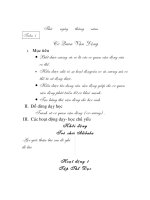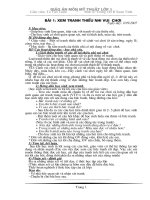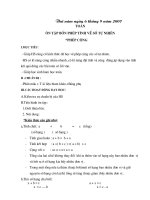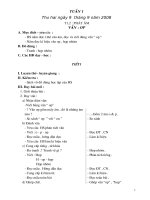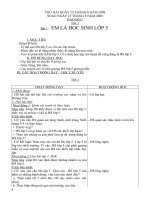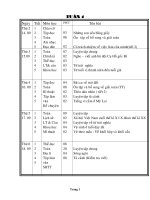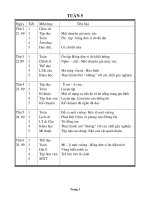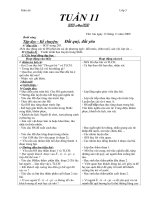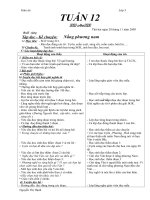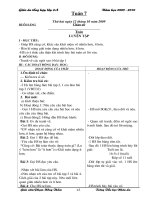Giao an tong hop
Bạn đang xem bản rút gọn của tài liệu. Xem và tải ngay bản đầy đủ của tài liệu tại đây (284.43 KB, 56 trang )
UNIT 6:
THE ENVIRONMENT
A. VOCABULARY
Week
Date of preparing:
Period: 37
Date of teaching:
I/ OBJECTIVE:
By the end of the lesson, students can talk about the activities in the country
II/ LANGUAGE CONTENT:
Vocabulary:
Grammar: the simple past tense
III/ TECHNIQUES:
Question-answer
Role play
Guessing
IV/ TEACHING AIDS:
Pictures
Cassette recorder & tape
V/ PROCEDURES:
METHOD
1. Warm up:
T has Sts play a guessing game.
“It’s way you get information.
M E D I A
Brainstorming the word “Media”.
T: How often do you listen to the news?
S: I often ____.
2. Practice:
I/ T: guides Sts to complete the blanks with suitable
words.
S: work in individually to choose the correct words.
T: has some Sts present their choice.
S: present their choice.
T: explains and gives the key to each sentence.
T: explains the new words.
II/ T: explains the new words.
S: do the test.
T: checks and gives the key.
T: explains the position of verbs, nouns, adjectives
and adverbs.
T: guides Sts to do the practice.
S: do the practice.
T: checks Sts’ comprehension.
T: explains the new words.
S: do the test.
T: checks and gives the key.
III /
T: guides Sts to practice the structure V + V-ing.
S: do the practice.
T: checks and gives the key.
S: give the meanings to the sentences.
CONTENT
environment
I/ Choose the correct words
* New words
- fit (adj)
- development (n)
- commerce (n)
* Key to the test
1–B 2–D 3–C 4–B 5–C
6 – C 7 – B 8 – A 9 – C 10 – A
II/ Complete each
word from the list
* Key to the test
1 – magazines
3 – available
5 – consuming
7 – information
9 – website
sentence with a
2 – benefit
4 – the Internet
6 – channels
8 – computer
10 – criers
III/ Complete each sentence with the
correct form of the verbs in the box
1. making
2. writing
3. looking
4. smoking
T: corrects if possible.
5. seeing
3. Post practice:
7. coming
S: introduce the places they used to take their friends 9. meeting
to or they’re going to take their friends to.
Homework:
- Students write a passage to way of learning English
- Prepare for the next part GRAMMAR AND STRUCTURE
6. swimming
8. saying
10. Playing
I/ Choose A, B, C or D to complete the following sentences.
1. This newspaper is _____ everyday. It’s a daily newspaper.
A. publishing
B. published
C. to publish
D. publish
2. He shouted and looked _____ at me when I broke the vase.
A. angry
B. angrily
C. angrier
D. angrity
3. He is tired _____ he stayed up late watching TV.
A. so
B. because
C. but
D. and
4. We are talking about the preservation of _____ resources.
A. natural
B. naturally
C. nature
D. naturalize
5. Is he really _____ that you can’t come there?
A. disappoint
B. disappointed
C. disappointing
D. to disappoint
6. I think most children are creative enough to write _____ poems.
A. protect
B. protecting
C. to protect
D. protected
7. It is our policy to _____ forests and increase forestation.
A. prevent
B. preventing
C. to prevent
D. prevented
8. Can you tell me who _____ this kind of machine?
A. invented
B. invention
C. inventor
D. inventive
9. The next stage in the development of television is _____ TV.
A. interact
B. interaction
C. interactive
D. interactively
10. Remote controls are used to ____ with TV.
A. interact
B. interaction
C. interactive
D. interactively
II/ Complete each sentence with a word from the list
consuming – magazines – benefit – website – channels
available – the Internet – criers – computer - information
1. Kien Thuc Ngay Nay is one of the most popular ______.
2. Nobody can deny the _____ of the Internet in our life.
3. The Internet is _____ in our city, so you can easily get access to it.
4. _____ has developed and become part of our daily life.
5. I think that watching TV is time _____.
6. We can see many international programs on different _____.
7. The Internet is a very fast to get _____.
8. I don’t like playing ____ games.
9. I don’t know which _____ is useful for me.
10. The businessmen of ancient Egypt hired ____ to shout about the things they wanted to sell.
III/ Complete each sentence with the correct form of the verbs in the box
look – make – write – say – meet – play – smoke – come – swim - see
1. Could you please stop ____ so much noise?
2. She enjoys ____ letters.
3. Why do you keep on _____ at me like that?
4. _____ is unhealthy, but a lot of people find it difficult to stop.
5. We’re looking forward to ____ you.
6. _____ every day is a good way of keeping fit.
7. I’m tired of ____ to the same place every week.
8. She left without ____ goodbye.
9. Do you enjoy _____ people from other countries?
10. She practices _____ the piano 2 hours a day.
UNIT 6:
THE ENVIRONMENT
B. GRAMMAR AND STRUCTURE
Date of preparing:
Week
Date of teaching:
Period: 38
I/ OBJECTIVE:
By the end of the lesson, students can use conditional sentences
II/ LANGUAGE CONTENT:
Grammar: conditional sentences
III/ TECHNIQUES:
Question-answer
Role play
Guessing
IV/ TEACHING AIDS:
Pictures
V/ PROCEDURES:
METHOD
CONTENT
1. Warm up:
Tag questions
T: gives a sentence and has Sts to S + V (special) …, V (special) + S?
supply the tag questions.
S + V (ordinary) …, V (auxiliary) + S?
S: do the practice.
Let’s …, shall we?
T: introduces the content of the text.
Command, will you?
2. Presentation:
I/ Choose A, B, C or D to complete the following
I/
sentences
T: explains the structures of tag 1. D 2. B 3. A 4. C 5. D.
questions.
6. B 7. A 8. D 9. D 10. B
S: review the formation.
II/ Choose the correct form of the verb
T: guides Sts to do the practice.
1. start
2. reading
S: do the practice.
3. pay
4. to buy
T: checks and gives the key.
5. writing
6. playing
II/
7. live
8. were you doing
T: Explains the structures.
III/ Supply the correct verb form
S: do the practice.
1. to do
2. painting
T: checks and gives the key.
3. learning
4. having
III/
5. to post
6. to do
T: explains how to match the columns. 7. listening
8. to talk
S: do the test.
9. learning
10. going
T: checks and gives the key.
IV/ Complete the following sentences with correct
IV/
tag questions
T: guides Sts to rewrite.
1. do you
2. won’t she
S: do the practice.
3. doesn’t he
4. doesn’t he
T: checks and gives the key.
3. Post practice:
S: report what their friends say.
Homework:
- Students write a report
- Prepare for the next part SPEAK
Experience
5. isn’t it
7. do you
8. shall we
6. won’t they
8. does he
10. will you
I/ Choose A, B, C or D to complete the following sentences
1. I will be ____ if she manages to sell that motorbike at a high price.
A. surprise
B. surprised
C. surprising
D. to surprise
2. Unless you understand, I ____ explain it again to you.
A. am
B. was
C. will
D. would
3. If you know where she lives, please let me ____.
A. know
B. knew
C. known
D. to know
4. Don’t talk in class, ____ you? The teacher is explaining the lesson.
A. do
B. don’t
C. will
D. won’t
5. He laughs a lot because _____ her funny face.
A. in
B. at
C. on
D. of
6. I remember _____ her somewhere.
A. see
B. seeing
C. saw
D. to see
7. Excuse me. Can I _____ in this area?
A. smoke
B. smoking
C. smoked
D. to smoke
8. We don’t allow passengers _____ in this part of the building.
A. smoke
B. smoking
C. smoked
D. to smoke
9. Don’t forget _____ the letter for me! I won’t.
A. post
B. posted
C. posting
D. to post
10. He thinks that ____ on the Internet is a waste of time.
A. chat
B. chatting
C. chatter
D. to chat
II/ Choose the correct form of the verb
1. She must start / starting / to start the job as soon as possible
2. I stopped read / to read / reading my book and went to bed
3. Let me to pay / paying / pay for the meal
4. I asked my younger brother buying / buy / to buy some stamps
5. Have you finished writing / to write / write that letter yet?
6. They enjoyed play / playing / to play football after school
7. Tom used to live / living / lived in the house at the end of this street
8. What were you doing / are you doing / did you do when I came to your office yesterday?
III/ Supply the correct verb form
1. It took me two hours (do) _____ this work.
2. When did you finish (paint) ____ the kitchen?
3. I began (learn) _____ English when I was seven.
4. Some people like (have) ____ breakfast in bed, but I don’t.
5. Don’t forget (post) ____ my letter!
6. What do you want (do) ____ tonight?
7. I love (listen) _____ to pop music.
8. She continued (talk) ____ during the whole meal.
9. They spent all morning (learn) _____ the lessons.
10. I am fond of (go) _____ to the movie on Sundays.
IV/ Complete the following sentences with correct tag questions
1. You don’t like tea, _____?
2. Ann will be here soon, _____?
3. Peter plays soccer very well, _____?
4. Her father goes to work at 6 AM, _____?
5. This picture is yours, _____?
6. They will go to HCMC next week, _____?
7. You don’t use the Internet very often, _____?
8. He never goes to school late, _____?
9. Let’s go somewhere for a drink, _____?
10. Open the door, _____?
UNIT 6:
THE ENVIRONMENT
C. SPEAK
Week
Period: 39
Date of preparing:
Date of teaching:
I/ OBJECTIVE:
By the end of the lesson, Sts can ask and answer environment protection
II/ LANGUAGE CONTENT:
Grammar: The simple present tense
III/ TECHNIQUES:
Question-answer
Role play
IV/ TEACHING AIDS:
Pictures
OHP
V/ PROCEDURES:
METHOD
CONTENT
1. Warm up:
- T asks some questions about students
T: What do you do to reduce your household
bills?
S: find out the answers
T: introduces the new lesson
2. Practice:
T: lets Sts read the words for the blanks.
S: read and get the meanings.
T: guides Sts to complete the blanks
* Key to the conversation
S work in pairs and take notes
1. D
T: checks comprehension
2. B
S: complete the conversation
3. E
T: corrects mistakes if possible
4. A
S ask and answer in pairs aloud
5. C
3. Post speaking:
T: Guides Sts work in groups to find out the
ways to reduce pollution
S: report their solution in front of the class
Homework:
- Sts write a paragraph to tell about their home village
- Prepare for the next part READ
Put the conversation in the correct order
a. We can reduce car exhaust fumes, can’t we?
b. How can we reduce air and water pollution?
c. It’s a serious problem that our local authorities are trying to solve
d. What should we do to protect our environment?
e. That’s a good idea
A: (1) _______________?
B: I think we should reduce water and air pollution
A: (2) _______________.
B: How about reducing the amount of garbage we produce?
A: Well! (3) _________.
B: Why don’t we persuade people to use public buses instead of motorbikes and cars?
A: In this way (4) _____.
B: Yes, that’s right. Say, don’t you think smokes from industrial factories pollute the air?
A: Why not? (5) ______
B: Well, it would be better if those factories were built far away from living areas.
UNIT 6:
THE ENVIRONMENT
D. READ
Week
Date of preparing:
Period : 40
Date of teaching:
I/ OBJECTIVE:
By the end of the lesson, Sts can find out the way to protect the environment
II/ LANGUAGE CONTENT:
Vocabulary:
Grammar: The simple present and the present perfect tense
III/ TECHNIQUES:
Question-answer
Role play
IV/ TEACHING AIDS:
Pictures
OHP
V/ PROCEDURES:
METHOD
CONTENT
1. Warm up:
- Have you ever take part in any activities to I/ Choose A, B, C, or D to complete the
protect the environment?
passage
- Why did you do that?
1. B
S: work in groups to give the answers.
2. A
2. Presentation:
3. D
T: introduces the new lesson, reviews some 4. A
causes that pollutes the environment.
5. D
3. While reading:
6. C
T: has Sts read and choose the words to fill in the 7. C
blanks.
8. B
S: work in groups.
9. C
T: has Sts read their answers aloud.
10. B
T: corrects mistakes if possible and gives the key. II/ Fill in the blanks with proper words,
then answer the following questions
1. pollution
2. serious
T: guides Sts to read the passage.
3. exhaust
4. percentage
S: read the words for the blanks.
5. factories
6. reduce
T: explains how to complete.
7. scientists
8. require
S: work in pairs to complete.
* Questions
T: corrects mistakes if possible.
1. Yes, they do
S: read the questions and answer them.
2. Yes, it is. Because much pollution is
T: checks and gives the key.
caused by things that benefit people
3. Scientists and engineers can work to
find ways to lessen the amount of
pollution
4. To reduce pollution, Government can
4. Post reading:
pass and enforce laws that require
S: talk about the environment.
businesses and individuals to stop, or cut
down on certain pollution activities
Homework:
- Students write a passage about protecting the environment
- Prepare for the next part WRITE
I/ Choose A, B, C, or D to complete the passage
These days, it is impossible to open a newspaper (1) ____ reading about the damage we are doing to
the environment. The earth is being threatened (2) ____ the future looks bad. (3) ____ can each of
us do? We can't clean (4) ____ our polluted rivers and seas overnight. Nor can we stop the (5) ____
of plans and animals. But we can stop adding to the environment (6) ____ scientists look for
answers. It may not be easy to change your lifestyle (7) ____ but some steps are easy to take: cut
down the amount of driving you do, or use as little plastic as possible. It is also easy to save (8)
____, which also (9) ____ household bills. We must make a personal decision to work for the future
of our planet if we want to ensure a better world (10) ____ our grandchildren
1. A. with
B. without
C. and
D. but
2. A. and
B. however
C. so
D. moreover
3. A. Where
B. When
C. Why
D. What
4. A. up
B. to
C. on
D. in
5. A. appear
B. appearance
C. disappear
D. disappearance
6. A. when
B. during
C. while
D. within
7. A. complete
B. completeness
C. completely
D. to complete
8. A. water
B. energy
C. money
D. health
9. A. adds
B. decreases
C. reduces
D. supplies
10. A. from
B. for
C. to
D. in
II/ Fill in the blanks with proper words, then answer the following questions
scientists – pollution – serious – factories – exhaust – reduce – require – percentage
Everyone wants to reduce (1) _____. But the pollution problem is as complicated as it is. (2) ____ It
is complicated because much pollution is caused by things that benefit people. For example, (3)
____ from automobile provides transportation to millions of people. (5) ____ discharge much of the
material that pollutes air and water, but factories give employment to a large number of people.
Thus, to end or greatly (6) ____ pollution immediately, people would have to stop using many
things that benefit them. Most people do not want to do that, of course. But pollution can be
gradually reduced in several ways. (7) ____ and engineers can work to find ways to lessen the
amount of pollution that such things as automobiles and factories cause. Government can pass and
enforce laws that (8) ____ businesses and individuals to stop, or cut down on certain pollution
activities.
* Questions
1. Do things that benefit people bring about pollution?
2. is it complicated to reduce pollution? Why or why not?
3. Who can find ways to lessen the amount of pollution?
4. What can the government do to reduce pollution?
UNIT 6:
THE ENVIRONMENT
E. WRITE
Week
Date of preparing:
Period: 41
Date of teaching:
I/ OBJECTIVE:
By the end of the lesson, Sts can use “because and because of”
II/ LANGUAGE CONTENT:
Vocabulary: bark,
Grammar: conditional sentences
III/ TECHNIQUES:
Question-answer
Role play
IV/ TEACHING AIDS:
Pictures
OHP
V/ PROCEDURES:
METHOD
CONTENT
1. Presentation:
I / Make sentences from the words and phrases
T: reviews the structure of noun provided
phrase and clause.
1. If you are late again you will lose your job.
S: give some clauses and change 2. I can’t see anything because it is very dark.
into noun phrases.
3. His parents are happy because he gets a good job.
T: explains how to use “because 4. My dog always barks if it hears a strange sound.
and because of”.
5. She will be late for work because she misses the bus.
S: give some examples.
6. She can’t work hard because she is very old.
2. Practice:
7. If the homework isn’t long and difficult I will finish it
I/
on time.
T: guides Sts to complete the 8. She can’t read these books because she doesn’t have
sentences.
enough time.
S: complete the sentences.
9. We can’t go for a walk because it rains heavily.
T: checks and gives the key.
10. If people stop using dynamite for fishing many sea
creatures will be well persevered.
II/
II / Rewrite these sentences by using “BECAUSE”
T: guides Sts to change into 1. He couldn’t meet you because he is busy.
“because”.
2. She went to bed early because she was sick.
S: work in groups to change into 3. Nobody can do this test because it is very difficult.
“because”.
4. Two cars can’t pass each other because the road is
T: has other students correct the narrow.
sentences.
5. We spent the whole day in the garden because the
T: corrects the sentences if possible
3. Post writing:
T: guides Sts to write a complaint
letter
S: write some ideas about the topic
“pollution”
weather was lovely.
6. He can’t go to school today because he is having a
toothache.
7. I can’t play basketball because I am not tall.
8. She must stay in bed because she is ill.
9. We can’t swim in this part of the river because the
water is highly polluted.
10. They couldn’t keep on cleaning the beach because it
rained heavily.
Homework:
- Sts write a complaint letter about pollution
- Prepare for the next part
I/ Make sentences from the words and phrases provided
1. If you / late again / you / lose / job
2. I / not see / anything / because / it / be / dark
3. His parents / be happy / because / he / get / good job
4. My dog / always bark / if / hear / strange sound
5. She / be late / work / because / miss / bus
6. She / not work / hard / because / be / old
7. If / homework / not be / long and difficult / I / finish / on time
8. She / not read / books / because / not have / enough time
9. We / not go / a walk / because / it / rain heavily
10. If / people / stop / use dynamite / fishing / sea creatures / be well persevered
II/ Rewrite these sentences by using “BECAUSE”
1. He couldn’t meet you because of being busy.
2. She went to bed early because of her sickness.
3. Nobody can do this test because of its difficulty.
4. Two cars can’t pass each other because of the narrow road.
5. We spent the whole day in the garden because of lovely weather.
6. He can’t go to school today because of his toothache.
7. I can’t play basketball because of my height.
8. She must stay in bed because of her illness.
9. We can’t swim in this part of the river because of highly polluted water.
10. They couldn’t keep on cleaning the beach because of heavy rain.
UNIT 6:
THE ENVIRONMENT
E. WRITE
Date of preparing:
Date of teaching:
I/ OBJECTIVE:
By the end of the lesson, Sts can use “because and because of”
II/ LANGUAGE CONTENT:
Vocabulary: poverty
Grammar: noun clauses
III/ TECHNIQUES:
Question-answer
Role play
IV/ TEACHING AIDS:
Week
Period: 42
Pictures
OHP
V/ PROCEDURES:
METHOD
1. Presentation:
T: reviews the structure of noun
phrase and clause.
S: give some clauses and change
into noun phrases.
T: explains how to use “because
and because of”.
S: give some examples.
2. Practice:
I/
T: guides Sts to change into
“because of”.
S: work in groups to change into
“because of”.
T: has other students correct the
sentences.
T: corrects the sentences if
possible.
II/
T: guides Sts to complete the
sentences.
S: complete the sentences.
T: checks and gives the key.
3. Post writing:
T: guides Sts to write a complaint
letter.
S: write some ideas about the topic
“pollution”.
CONTENT
I/ Rewrite these sentences by using “BECAUSE OF”
1. She can’t work hard because of her age.
2. He likes her because of her beauty.
3. He couldn’t go to school because of his poverty.
4. I can’t buy this bike because of not having enough
money.
5. He broke the vase because of his carelessness.
6. He failed the exam because of not learning the lesson
carefully.
7. We can’t go for a walk because heavy rain.
8. He left school because of his hard life.
9. She was very happy because of being given a new
bike
10. I went to bed early because of feeling tired
II/ Write correct sentences to make a complete letter
1. I am writing to you about bad situation, which is
affecting the lake near my school.
2. As you know, the lake near my school is very
beautiful.
3. However, it has become polluted.
4. People have used electricity to catch fish.
5. A lot of fish died and floated on the water surface.
6. People have thrown rubbish and waste into the lake.
7. Now, bad smell is affecting my school children’s
health.
8. What do you think about this polluted air?
9. I am looking forward to hearing from you and seeing
the protection of the environment from the local
authority.
10. Sincerely, Long.
Homework:
- Sts write a complaint letter about pollution
- Prepare for the next part
I/ Rewrite these sentences by using “BECAUSE OF”
1. She can’t work hard because she is old.
2. He likes her because she is beautiful.
3. He couldn’t go to school because he was very poor.
4. I can’t buy this bike because I don’t have enough money.
5. He broke the vase because he was careless.
6. He failed the exam because he didn’t learn the lesson carefully.
7. We can’t go for a walk because it rains heavily.
8. He left school because his life was hard.
9. She was very happy because she was given a new bike.
10. I went to bed early because I felt tired.
II/ Write correct sentences to make a complete letter
1. I / write / you / bad situation / affect / lake / school.
2. As you know / lake / school / be beautiful.
3. However / it / become / polluted.
4. People / electricity / fish.
5. A lot / fish / die / float / water surface.
6. People / throw / rubbish / waste into / lake.
7. Now / bad smell / affect / school children’s health.
8. What / you think / polluted air?
9. look forward to / hear / you / see / protection / environment / local authority.
10. Sincere / Long.
UNIT 7: SAVING ENERGY
A. VOCABULARY
Date of preparing:
Week
Date of teaching:
Period: 43
I/ OBJECTIVE:
By the end of the lesson, students can talk about saving energy
II/ LANGUAGE CONTENT:
Vocabulary:
Grammar: the simple past tense
III/ TECHNIQUES:
Question-answer
Role play
Guessing
IV/ TEACHING AIDS:
Pictures
Cassette recorder & tape
V/ PROCEDURES:
METHOD
CONTENT
I/ T: guides Sts to complete the blanks.
I/ Choose the correct words.
S: work in individually to choose the correct words. * New words
T: has some Sts present their choice.
1–A 2–D 3–C 4–A 5–B
S: present their choice.
6 – B 7 – D 8 – C 9 – A 10 – B
T: explains and gives the key to each sentence.
II/ Complete each sentence with a
T: explains the new words.
word from the list.
II/ T: explains the new words.
1 – plumber
2 – environment
S: do the test.
3 – reduce
4 – enormous
T: checks and gives the key.
5 – atmosphere
6 – consumer
III/
7 – resources
8 – luxury
T: guides Sts to do the practice.
9 – necessities
S: do the practice.
III/ Complete each sentence.
T: checks and gives the key.
1. looks up
2. gets over
S: give the meanings to the sentences.
3. look after
4. saw off
T: corrects if possible.
5. taken over
6. turn off
IV/
7. taken up
8. took off
T: guides Sts to do the practice.
9. looking for
10. turned over
S: do the practice.
IV/ Supply the correct form.
T: checks and gives the key.
1. dripping
2. reducing
S: give the meanings to the sentences.
3. worried
4. protection
T: corrects if possible.
5. extremely
6. slowly
Post practice:
7. carefully
8. wonderful
S: talk about the environment.
9. environmentalist 10. seriously
Homework:
- Students write a passage talk about the environment
- Prepare for the next part GRAMMAR AND STRUCTURE
I/ Choose A, B, C or D to complete the following sentences
1. Can you turn ____ the light? It’s too dark.
A. on
B. off
C. in
D. for
2. What are you looking _____? My picture book. I’ve lost it.
A. on
B. off
C. in
D. for
3. There are ____ saving methods and inventions to use solar energy.
A. energetic
B. energize
C. energy
D. energertics
4. I had to pay much money this month for the international _____.
A. calls
B. calling
C. to call
D. called
5. A new air-conditioner will be ____ this morning.
A. to install
B. installed
C. installing
D. install
6. Scientists are looking for an ____ way to reduce energy consumption.
A. effect
B. effection
C. effective
D. effectively
7. We can ____ easily in the daylight.
A. to read
B. reading
C. readed
D. read
8. She won’t take these suitcases ____ she likes to travel light.
A. so
B. but
C. because
D. therefore
9. They are completely short of water now. A number of people have died because of this ____.
A. shortage
B. short
C. shorten
D. shortly
10. What can we do to spend less ____ lighting?
A. in
B. on
C. about
D. of
II/ Complete each sentence with a word from the list.
environment – necessities – plumber – luxury
enormous – reduce – resources – consumer – atmosphere
1. person who puts in and repairs water pipe, bath sinks.
2. the air, water and land in which we live.
3. to make something less.
4. very large, very great.
5. the air surrounding the Earth.
6. person who buy things or uses services.
7. wealth, goods or products people can use.
8. great comfort and pleasure.
9. needs.
_______
_______
_______
_______
_______
_______
_______
_______
_______
III/ Complete each sentence by using the correct phrasal verbs in the box. Put the verbs into
the correct tense form.
look after – get over – see off – turn over – look up
take over – look for – take up – turn off – take off
1. Every Vietnamese ____ to President Ho Chi Minh.
2. He ____ difficulties to reach the discuss.
3. She finds someone to ____ the dog and plants because she is going on holiday next week.
4. My father ____ me ____ at the station last night.
5. Hanoi was ____ in 1954.
6. Remember to ____ the lights before going out.
7. He was ____ by the police.
8. I was very nervous as the plane ____.
9. I am ____ to hearing from you.
10. He has ____ the business ____ to his friend.
IV/ Supply the correct form of the words in parentheses.
1. There is a ____ faucet in your kitchen. (drip)
2. We can protect the environment by ____ air pollution. (reduction)
3. I’m very ____ because they use electricity to catch fish. (worry)
4. I want to see the ____ of environment from the local authority. (protect)
5. She was ____ pleased that she passed the exam. (extreme)
6. The old man walked ____ to the park. (slow)
7. Don’t forget to drive ____. (care)
8. That’s ____! I’m pleased that you work very hard. (wonder)
9. He is one of the most famous ____ in the world. (environment)
10. If we go on littering, the environment will become _____ polluted. (serious)
UNIT 7: SAVING ENERGY
B. GRAMMAR AND STRUCTURE
Date of preparing:
Week
Date of teaching:
Period: 44
I/ OBJECTIVE:
By the end of the lesson, students can use conjunctions
II/ LANGUAGE CONTENT:
Grammar: adverb clauses
III/ TECHNIQUES:
Question-answer
Role play
Guessing
IV/ TEACHING AIDS:
Pictures
V/ PROCEDURES:
METHOD
CONTENT
1. Warm up:
T: gives tow clauses and has Sts join the clauses by
using conjunctions.
S: do the practice.
T: introduces the content of the text.
2. Presentation:
I/
I/ Choose A, B, C or D to complete
T: explains the structures of conjunctions.
the following sentences.
S: review the formation.
1. D 2. B 3. A 4. B 5. B
T: guides Sts to do the practice.
6. B 7. D 8. C 9. A 10. B
S: do the practice.
T: checks and gives the key.
II/
T: Explains the conjunctions.
S: do the practice.
T: checks and gives the key.
3. Post practice:
S: Write some sentences with the conjunctions
Homework:
- Students write a report
- Prepare for the next part
II/ Complete the sentences using
“AND / BUT / SO / OR / BECAUSE”.
1. but
2. because
3. but
4. because
5. and
6. because
7. or
8. so
9. and
10. but
SPEAK
I/ Choose A, B, C or D to complete the following sentences.
1. She is very tired; ____ she has to finish her homework.
A. moreover
B. so
C. and
D. however
2. Is he an actor ____ a singer? An actor.
A. and
B. or
C. with
D. so
3. He was tired, ____ he took a rest before continuing the work.
A. so
B. and
C. but
D. if
4. She forgot ____ off the gas before going out.
A. turn
B. turning
C. to turn
D. turned
5. I suggest ____ money for the poor people in our neighborhood.
A. save
B. saving
C. to save
D. saved
6. Who looks ____ your children when you are away from home.
A. for
B. at
C. after
D. to
7. Why doesn’t she go ____ with her university study?
A. in
B. at
C. to
D. on
8. After coming home, she cleaned the floor ____ cooked dinner.
A. but
B. however
C. moreover
D. and
9. They didn’t understand the matter; ____ they didn’t ask for help.
A. but
B. however
C. moreover
D. and
10. He got wet ____ he forgot his umbrella.
A. because of
B. because
C. but
D. and
II/ Complete the sentences using “AND / BUT / SO / OR / BECAUSE”
1. I like Mary very much ____ I don’t like her brother.
2. I’d like to live somewhere by the Mediterranean ____ I love the Sun.
3. We enjoy learning English ____ we find it very difficult.
4. I can’t go out tonight ____ I am short of money.
5. She went to the theater last night ____ had a wonderful time.
6. They can’t walk home ____ it is very dark.
7. Would you like to drink milk ____ coffee?
8. It’s raining heavily, ____ I can’t go out.
9. He did the test well ____ I did, too.
10. His life was hard ____ he studied very well.
UNIT 7:
SAVING ENERGY
C. SPEAK
Date of preparing:
Date of teaching:
Week
Period: 45
I/ OBJECTIVE:
By the end of the lesson, Sts can ask and answer environment protection
II/ LANGUAGE CONTENT:
Grammar: The simple present tense
III/ TECHNIQUES:
Question-answer
Role play
IV/ TEACHING AIDS:
Pictures
OHP
V/ PROCEDURES:
METHOD
CONTENT
1. Warm up:
S + suggest + S + should + bare inf
- T asks some questions about I/ How do you suggest these people.
students.
1. I suggest he should use banana leaves to wrap food.
T: What do you do to reduce 2. I suggest she should turn off the lights when going to bed.
your household bills?
3. I suggest he should buy a new motorcycle.
S: find out the answers.
4. I suggest they should use fishing rod or net to catch fish.
T: introduces the new lesson. 5. I suggest you should call a plumber to repair those pipes.
2. Practice:
6. I suggest you should read books or listen to the music.
T: guides St to make 7. I suggest they should use energy saving bulbs.
suggestions.
8. I suggest he should go to the dentist.
S work in pairs and take 9. I suggest he should learn English harder.
notes.
10. I suggest they should use solar energy.
T: corrects mistakes if II/ 1-E2-D 3-A 4-F 5-B 6-C
possible.
III/
II/ S read the dialogue and 1. Good evening, ladies and gentlemen. My name is ____ and
complete it.
today I’m going to tell you how to save energy in your house.
T: checks and gives the key.
You can do this by:
III/
- Using energy saving bulbs.
T: guides Sts to make a - Turning off the unwanted lights.
passage.
- Preparing food before turning on the stove.
S: make it and present aloud. - Using solar energy.
T: corrects if possible.
If you follow these simple rules, not only you will save
energy, but also your money will be saved.
2. Good evening, ladies and gentlemen. My name is ____ and
today I’m going to tell you how to reduce air pollution.
You can reduce this amount by:
- Using public buses or bicycles.
3. Post speaking:
- Not leaving of garbage.
T: Guides Sts work in groups - Putting different kinds of waste in different places.
to find out the ways to reduce - Keeping personal hygiene and public health.
pollution.
- Using solar energy instead of coal, gas, and oil.
S: report their solution in If you follow these simple rules, not only you reduce air.
front of the class.
pollution, but also the environment will be cleaner.
Homework:
- Sts write a paragraph to tell about their home village
- Prepare for the next part READ
I/ How do you suggest these people.
1. he uses plastic bag to wrap food.
2. She always turns on the lights when going to bed.
3. His motorcycle uses too much gas.
4. They use electricity to catch fish.
5. There are many cracks in your pipes.
6. I don’t watch TV for recreation.
7. They use many ordinary 100 watt light bulbs.
8. He is having a toothache.
9. He wants to go to Australia for studying.
10. They use too much coal, gas and oil.
→ I suggest ………
→ I suggest ………
→ I suggest ………
→ I suggest ………
→ I suggest ………
→ I suggest ………
→ I suggest ………
→ I suggest ………
→ I suggest ………
→ I suggest ………
II/ Write the expressions from the list in the correct places in the dialogue.
a. Take showers instead of faucets
b. To save electricity
c. By taking showers instead of faucets
d. That’s a good idea
e. Because it is important in everyone’s life
f. The roof of the house
A: Why should we save energy?
B: (1) …………………………
A: How about going to the movies tonight?
B: (2) ………………………..
A: What should we do to save water?
B: (3) ………………………..
A: When can solar panels be placed?
B: (4) ……………………….
A: What’s the purpose of using energy-saving bulbs?
B: (5) ……………………….
A: How can we save water?
B: (6) ………………………
III/ Make a speech
1. How to save energy in your house.
- Using energy saving bulbs.
- Turning off the unwanted lights.
- Preparing food before turning on the stove.
- Using solar energy.
2. How to reduce air pollution.
- Using public buses or bicycles.
- Not leaving of garbage.
- Putting different kinds of waste in different places.
- Keeping personal hygiene and public health.
- Using solar energy instead of coal, gas, and oil.
UNIT 7:
SAVING ENERGY
D. READ
Date of preparing:
Date of teaching:
I/ OBJECTIVE:
Week
Period: 46
By the end of the lesson, Sts can find out the way to protect the environment.
II/ LANGUAGE CONTENT:
Vocabulary:
Grammar: The simple present and the present perfect tense
III/ TECHNIQUES:
Question-answer
Role play
IV/ TEACHING AIDS:
Pictures
OHP
V/ PROCEDURES:
METHOD
CONTENT
1. Warm up:
- Have you ever take part in any activities to
protect the environment?
- Why did you do that?
S: work in groups to give the answers.
2. Presentation:
T: introduces the new lesson, reviews some I/ Fill the gap with a suitable word.
causes that pollutes the environment.
1. countries
2. necessities
3. While reading:
3. consumers
4. lighting
I/ T: has Sts read and choose the words to fill in 5. by
6. with
the blanks.
7. scheme
8. with
S: work in groups.
9. save
10. resources
T: has Sts read their answers aloud.
II/ Choose A, B, C, or D to complete the
T: corrects mistakes if possible and gives the key. passage.
II/ T: guides Sts to read the passage.
1. B 2. A 3. A 4. D 5. C
S: read the words for the blanks.
6. B 7. C 8. D 9. B 10. A
T: explains how to complete.
III/ Fill in the blanks with proper
S: work in pairs to complete.
words, then answer the following
T: corrects mistakes if possible.
questions.
III/
1. effectively
2. pollution
T: guides Sts to complete the passage.
3. energy
4. power
S: work in pairs to complete.
5. nuclear
6. electricity
T: corrects mistakes if possible.
7. panels
8. heat
S: read the questions and answer them.
9. stored
10. advanced
T: checks and gives the key.
* Questions
1. Yes, it is.
2. Solar panels are placed on the roof of a
house.
4. Post reading:
3. The energy can be stored for a number
S: talk about the environment.
of days.
4. No, it isn’t.
Homework:
- Students write a passage about protecting the environment.
- Prepare for the next part WRITE.
I/ Fill the gap with a suitable word.
In Western (1) ____ electricity, gas and water are not luxuries but (2) ____. Companies now realize
that (3) ____ want products that will not only work effectively, but also save money.
For most North American households, (4) ____ accounts for 10 percent of the electricity bill.
However, this amount can be reduced (5) ____ replacing an ordinary 100 watt light bulb (6) ___ an
energy saving bulb. These bulbs use a quarter of the electricity of standard bulbs and last eight times
longer. Therefore consumers can save about US$7 to US$21 per bulb.
In Europe, there is a label (7) ____ for refrigerators, freezers, washing machines and tumble dryers.
The label tells the consumer how energy efficient each model is, compared (8) ____ other
appliances in the same category.
Ultimately, these innovations will (9) ____ money as well as conserving the Earth’s (10) ____.
II/ Choose A, B, C, or D to complete the passage.
In humankind’s millions (1) ____ years (2) ____ Earth, many types (3) ____ energy resources have
been utilized. However, (4) ____ the last ninety years, petroleum has become (5) ____ far the most
important. Accounting (6) ____ over 50 percent of all energy consumed, it is so essential that,
without petroleum, we could be faced (7) ____ economic disaster. Of course, the earth’s supply (8)
____ petroleum will not last forever, and (9) ____ fact, it will disappear sooner than most people
believe. (10) ____ the current rate of consumption, the world’s proven oil reserves may be
exhausted within forty or fifty years.
1. A. to
B. of
C. in
D. for
2. A. on
B. in
C. with
D. of
3. A. of
B. since
C. for
D. to
4. A. for
B. of
C. at
D. in
5. A. in
B. between
C. by
D. for
6. A. at
B. for
C. during
D. in
7. A. on
B. of
C. with
D. at
8. A. with
B. to
C. since
D. of
9. A. on
B. in
C. for
D. at
10. A. At
B. For
C. To
D. With
III/ Fill in the blanks with proper words, then answer the following questions.
power - effectively - nuclear - advanced - pollution - heat - electricity - stored - energy - panels
Are you looking for a cheap, clean (1) ____ source of power that doesn’t cause (2) ____ or waste
natural resources? Look no further than solar (3) ____ from our Sun.
At present, most of our (4) ____ come from the use of coal and gas, oil or (5) ____ power. This
power could be provided by the Sun. One percent of the solar energy that reaches the Earth is
enough to provide (6) ____ for the total population.
Many countries are already using solar energy. Solar (7) ____ are placed on the roof of a house and
the Sun’s energy is used to (8) ____ water. The energy can be (9) ____ for a number of days, so on
cloudy days you can use solar energy, too.
Sweden has an (10) ____ solar energy program. There, all buildings will be heated by solar energy
and cars will use solar power instead of gas by the year 2015.
* Questions
1. Is the solar energy an efficient source of power?
2. Where are the solar panels placed?
3. How long can the energy be stored?
4. Is the solar energy used in Vietnam now?
UNIT 7:
SAVING ENERGY
E. WRITE
Week
Date of preparing:
Period : 47
Date of teaching:
I/ OBJECTIVE:
By the end of the lesson, Sts can use “because and because of”.
II/ LANGUAGE CONTENT:
Vocabulary: bark,
Grammar: conditional sentences
III/ TECHNIQUES:
Question-answer
Role play
IV/ TEACHING AIDS:
Pictures
OHP
V/ PROCEDURES:
METHOD
CONTENT
1. Presentation:
I / Rewrite the following sentences so that the
T: reviews the structure of conjunctions.
second sentence means exactly the same as
S: give some conjunctions.
the sentence before it.
T: explains how to use conjunctions.
1. She was not beautiful but she took part in a
S: give some examples.
beauty contest.
2. Practice:
2. Since it was raining, we decided to postpone
I/
our camping.
T: guides Sts to rewrite the sentences.
3. She suggest they should sing a song.
S: complete the sentences.
4. As she was ill, she couldn’t come to class.
T: checks and gives the key.
5. She was busy so she couldn’t join us.
6. As she had a lot of difficulties, she managed
II/
to sell the house.
T: guides Sts to complete the passage.
7. What about going to the cinema tonight?
S: work in groups to complete the passage. 8. They suggested we should leave the place at
T: has other students correct the sentences. once.
T: corrects the sentences if possible.
9. As it is raining, I stay at home.
3. Post writing:
10. She wanted to go home because she was
T: guides Sts to write some sentences tired.
joining by conjunctions.
II/ Choose A, B, C, or D to complete the
S: write some sentences joining by passage
conjunctions.
1. A
2. B
3. D
4. A
5. C
6. A
7. B
8. B
9. C
10. D
Homework:
- Sts write a passage about saving energy.
- Prepare for the next part.
I/ Rewrite the following sentences so that the second sentence means exactly the same as the
sentence before it
1. Although she was not beautiful, she took part in a beauty contest.
→ She was not beautiful ……………………………………………
2. It was raining, so we decided to postpone our camping.
→ Since ………………..…………………………………………..
3. She wants them to sing a song.
→ She suggest they …………………………………………………
4. She couldn’t come to class because of her illness.
→ As …………………..……………………………………………
5. She couldn’t join us because she was busy.
→ She was busy …………………………………………………
6. Because of having a lot of difficulties, she managed to sell the house.
→ As ………………. ……………………………………………
7. Shall we go to the cinema tonight?
→ What about ……………………………………………………
8. They requested us to leave the place at once.
→ They suggested we …………………………….………………
9. I stay at home because it is raining.
→ As ………………………………………………………………
10. She was tired and therefore wanted to go home.
→ She wanted to go home because ………………………………
II/ Choose A, B, C, or D to complete the passage.
1. He is going to the post office ____ he wants to send a letter.
A. because
B. but
C. and
D. moreover
2. She bought potatoes ____ cabbage at the market.
A. although
B. and
C. however
D. but
3. They learn English _____ they intend to go abroad.
A. and
B. or
C. so
D. because
4. His hobbies are playing soccer _____ collecting stamps.
A. and
B. but
C. however
D. although
5. I’d love to play volleyball _____ I must complete my homework.
A. since
B. moreover
C. but
D. and
6. I wear a hat ____ I don’t want to be sick.
A. because
B. but
C. therefore
D. and
7. I am going to the supermarket _____ I want to buy some food.
A. therefore
B. because
C. but
D. however
8. Do you want to have coffee _____ tea?
A. and
B. or
C. although
D. and
9. She studies well ____ she is busy.
A. because
B. since
C. although
D. and
10. They went to school _____ it was raining hard.
A. however
B. and
C. therefore
D. although
UNIT 7:
SAVING ENERGY
E. WRITE
Date of preparing:
Date of teaching:
I/ OBJECTIVE:
By the end of the lesson, Sts can use “because and because of”.
II/ LANGUAGE CONTENT:
Vocabulary: poverty
Grammar: noun clauses
Week
Period: 48
